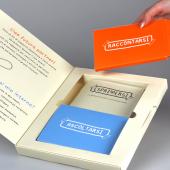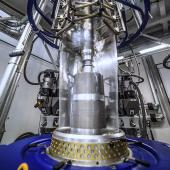Protagonists of the circular economy
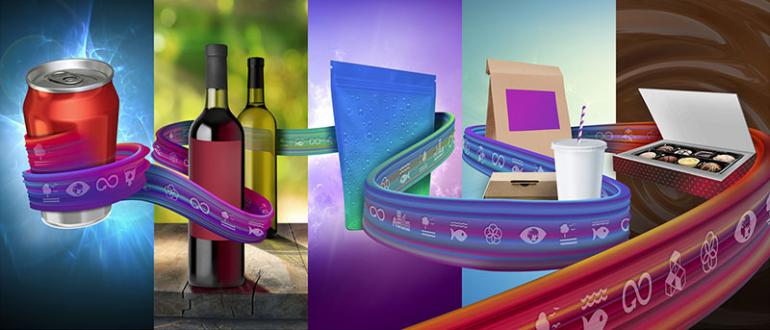
Sun Chemical, i.e. ideas and solutions for packaging printing, in line with the United Nations’ stated goals for sustainable development.
As explained by the Ellen MacArthur Foundation, a circular economy is “a new way to design, make, and use things within planetary boundaries.” Achieving this involves everyone and everything, from businesses and governments to individuals, cities, products and jobs, by:
- designing out waste and pollution;
- keeping products and materials safe;
- Regenerating natural systems.
Against authoritative forecasts of global packaging demand - expected to grow by 2.8% per year to reach 1.05 trillion dollars in 2024 - it is therefore desirable to bring those considerations back to the real world of packaging, where building a circular economy is not only about using or manufacturing less material (plastic or any other packaging substrate), but designing it properly so that it can be reused, recycled and/or become compost in a sustainable way.
Using printing inks as an example, a converter’s definition of a successful “sustainable ink” could be as simple as how well the ink and materials interact with each other to synergise the printing process. Inks that improve productivity on press or reduce waste could be seen as “green,” but the key regulatory terms commonly used in the packaging industry are “biodegradable,” “biorenewable” and “eco- efficient/eco-friendly.
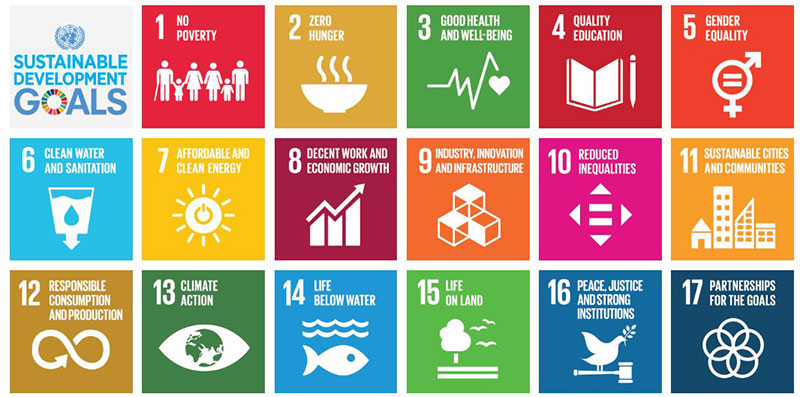
SUN CHEMICAL’S APPROACH TO SUSTAINABILITY
As a manufacturer of inks, key “ingredients” and supplements to the finished packaging, Sun Chemical is committed in various ways to supporting the packaging industry in achieving sustainability goals.
One example of this is the use of raw materials obtained from biorenewable sources in its production. One way in which this is done is by only using soybean oil that comes from already existing soybean crops in fields that have been certified as not replacing other pre-existing natural biodiversity.
In addition, Sun Chemical research has developed specific solutions for monomaterial packaging, with the aim of helping to further simplify recycling or even composting, especially plastic packaging (today characterized by a trend of reduction of layers of different polymers).
And inks play their part
By recognising the importance of sustainability as a global issue, Sun Chemical is looking to align its goals with those of the United Nations in its “Transforming Our World: the 2030 Agenda for Sustainable Development,” which is “a plan of action for people, planet and prosperity.”
To do this, Sun Chemical has identified, with reference to the 17 objectives expressed, the actions to be taken to help the packaging industry grow in a more sustainable way.
In this regard, we cite some innovative ranges of inks, developed on the basis of these principles.
For more information visit Sun Chemical website.
SunStrato® Duratort. Primarily made from polyurethane resins that are free of chlorine, nitrocellulose and monomeric plasticisers, these inks are suitable for flexo and rotogravure printing. They are commonly used for applications that require high-temperature processing, retort and sterilisation, as well as demanding product resistance requirements such as egg, detergents or aggressive cook-in sauces. As they are PVC free, easy recycling is possible, reducing the amount of waste packaging going to landfill.
The inks deliver the high speed, clean printing and low solvent retention required for maximum press efficiency, and provide the shelf standout and high-quality package look required in today’s competitive performance packaging market.
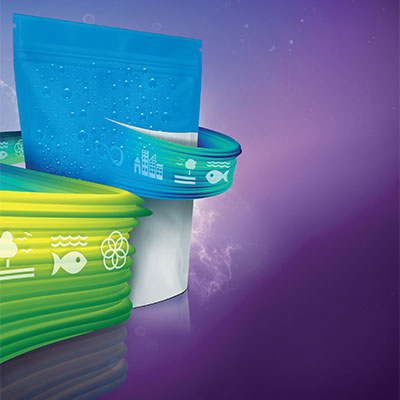
SunUno® Solimax, SunSpectro® Solvaplast/Aquathene. Packaging is compostable if the substrate that comprises it is compostable, which is why these inks and films have been developed and certified as Vincotte-TÜV for use on “okay to compost” packaging.
Compostable packaging results in less waste going into landfill/incineration and shows how the industry is being responsible for end-of-life scenarios.
These Sun Chemical compostable inks and film solutions are solvent- and water-based and used primarily for snack food applications like energy bars, biscuits, coffee cups and waste bags.
- Aquathene is for flexographic printing of compostable films and has good printability.
- Solimax flexographic solvent-based ink is suitable for printing various plastic films intended for both external printing and lamination with adhesives. These are suitable for pasteurisation, with heat treatment.
- Solvaplast ink, which has a solvent base, is suitable for printing the exterior of polyolefin films. They have good printability, gloss and excellent mechanical strength as well as high resistance to dry dusting and scratches.
SunVisto® AquaGreen™. These water-based inks and coatings are made from a significant portion of plant-based biorenewable inks (patented technology based on plant-derived resins, starch and other natural raw materials) for natural, cleaner, greener food packaging.
The aim of Sun Chemical’s sustainability initiatives relating to raw materials used and its manufacturing processes is to increase the plant-based biorenewable content (BRC) and/or recycled content in Sun Chemical products. This reduces the products’ effective carbon footprint and reduces the company’s reliance on finite oil resources.
The level of BRC in an ink, coating or adhesive can be measured using carbon isotope ratio analysis. This method gives clear results as to the BRC and conforms to the ASTM D6866-18 Method B standard. Although some of the raw materials are biorenewable, manufacturing conditions of these inks are the same.
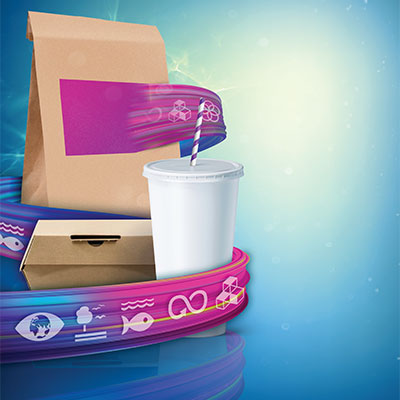
These inks are suitable for primary food packaging, resistant to abrasion, water and grease, with superior overall performance and no compromise on quality. SunVisto AquaGreen water-based inks are, for example, used on quick-service restaurant packaging, suche as sandwich cartons and wrappers, small carry-out bags, purpose-made bags with QR code linking to HAVI and Sun Chemical, paper cups for cold and hot beverages...
Switching to biorenewable inks is a good way for converters, end users and brand owners to be more sustainable. As with other water-based inks, waste is minimised, since inks that aren’t used on one run can be used for another.
Sun Chemical has entered into a partnership with HAVI, a global company that innovates, optimises, sources and manages the packaging and supply chains of leading foodservice brands, to bring its SunVisto AquaGreen biorenewable, natural-based inks to market.
Over the past three years, HAVI has worked closely with Sun Chemical to help develop natural-based inks which not only contain significantly higher levels of biorenewable resin content, but also deliver high-quality printing on fibre-based packaging substrates.
SunVisto® Aquasafe. Compatible with the European directive to eliminate single-use plastic by 2025, this ink is suitable for direct food contact and particularly for use on paper-based straws that can be recycled and are much more biodegradable than conventional plastic straws. By developing an ink which can be used on paper straws, Sun Chemical is supporting the efforts promoted in the Ellen MacArthur Foundation report on “The New Plastics Economy,” which estimates that by 2050, there could be more plastic than fish in the world’s oceans (by weight).











